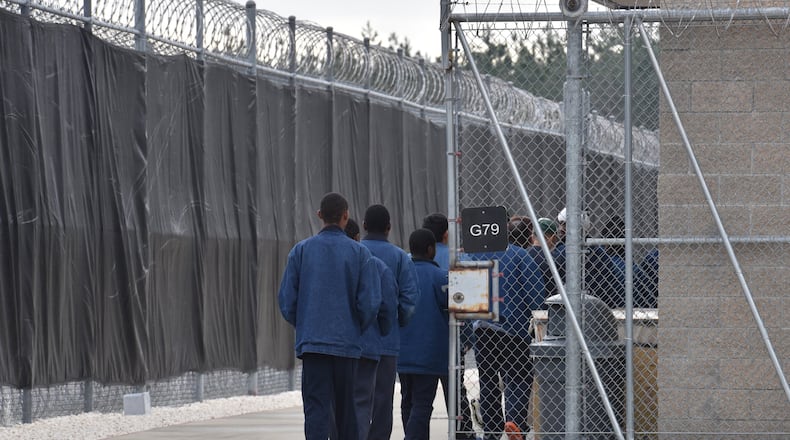People held in Georgia immigrant detention centers will soon face new challenges in their search for lawyers to represent them in immigration court, a development that will likely doom many people’s chances of fighting deportation.
Earlier this month, the Southern Poverty Law Center, a legal and advocacy group, announced it will be unwinding an initiative that has been providing legal assistance to detained migrants in Georgia since 2017. That run will end by fall. According to the U.S. Department of Justice, SPLC lawyers were the only providers of pro-bono legal representation at the immigration court inside Stewart Detention Center, a privately-run jail in the remote town of Lumpkin, near the Florida border.
Those SPLC staffers, whose team within the broader nonprofit was dubbed the Southeast Immigrant Freedom Initiative, also worked with detained migrants in Louisiana. Georgia and Louisiana are the two non-border states with the biggest populations of detained migrants nationwide. Most migrants in custody are recent border crossers apprehended by Border Patrol.
“It was a shock to get the news,” said Erin Argueta, a Lumpkin-based SIFI attorney. “I feel great sadness for my colleagues, and I also feel terrible for the people detained. Our number was the only one they could call that provides pro-bono, direct service representation. It’s devastating to know that overnight, that that resource, which was never enough, is gone.”
“It will leave a huge justice gap,” added Monica Whatley, senior project coordinator at SIFI.
Unlike defendants in criminal court, people who come before an immigration judge don’t have a right to a government-provided lawyer if they can’t afford to hire one themselves. Private attorneys are out-of-reach for many migrants, many of whom go into debt to finance their treacherous journeys to the U.S. border. Pro-bono representation is also difficult to come by countrywide – in part because demand vastly exceeds supply following historic border surges – and it’s especially rare in a place like Lumpkin, because of its rural location.
“Detained immigrants in Georgia tend to be held in remote areas, cut off from society, making it really difficult for them to access representation or have contact with family. SIFI was essentially the only resource that existed to help them, and they did excellent work,” said Jason Cade, a professor at the University of Georgia School of Law, in a statement.
Of the nearly 2,900 cases filed in Lumpkin in 2023, fewer than a quarter featured migrants with legal representation, according to an analysis of federal data by Syracuse University’s Transactional Records Access Clearinghouse (TRAC).
SIFI “was the only game in town,” said Marty Rosenbluth, a Lumpkin-based immigration attorney. “This is going to be a lot more work for us, and it’s not something we’re happy about.”
Margaret Huang, the SPLC’s president and chief executive officer, said the organization remains committed to advancing immigrants’ rights.
She said the representation of detained immigrants was “really, really important” work, but “it has often felt like we are trying to empty the ocean with the teaspoon,” given the vast number of people in immigration detention.
SPLC will focus on strategic litigation to challenge the immigrant detention ecosystem in a bigger-picture way.
“We think that’s the best use of our resources, to challenge systemic practices, rather than to represent individuals,” Huang said.
That restructuring came at the expense of 60 positions within SPLC’s staff, including all of SIFI.
For migrants fighting deportation, the services of an attorney can be a crucial difference-maker.
According to a 2018 study, people in immigration detention prevailed in just 3% of their cases when they didn’t have a lawyer. Those in detention but with an attorney are over 10 times more likely to establish a right to stay in the U.S. Non-detained people with lawyers are also significantly more likely to win their immigration cases.
SIFI worked with 257 clients in Georgia detention centers in 2023.
Laid-off SIFI staffers said their work with detained immigrants also helped bring a layer of oversight to facilities like Stewart Detention Center that are otherwise insulated from public scrutiny.
“Just having people that are always at the detention centers, always in the court, it means that the government can get away with less,” Argueta said. “Otherwise, if no one is going to the detention centers, then they’re kind of black holes where abuse can happen.”
So far in 2024, two people have died while in Georgia ICE detention.
A seven year-run
SIFI launched in 2017, when the beginning of former President Donald Trump’s administration brought new vigor – and a new spotlight – to immigration enforcement.
President Joe Biden has expanded some pathways to legally come to the U.S. and as recently as this month unveiled new protections for undocumented immigrants who are married to U.S. citizens. But as unlawful border crossings reached historic highs, he has also rolled out restrictions that progressive critics say mirror those of his predecessor, including a recent policy limiting migrants’ ability to apply for asylum. In Georgia, immigration detention is up 50% from this time last year.
SIFI staffers say that context makes their layoffs more difficult to stomach.
“Shutting down our immigration work at a time when detention in Georgia is increasing, Biden is cracking down on immigrants, an election is looming on the horizon really makes no sense,” Whatley said.
She added that staffers have started letting current clients know that SIFI is winding down their work. They are also turning down all new requests for assistance.
“It really sucks when you have that conversation and you really don’t have another place to point them to,” she said. “There is no number for them to call.”
About the Author
Keep Reading
The Latest
Featured




